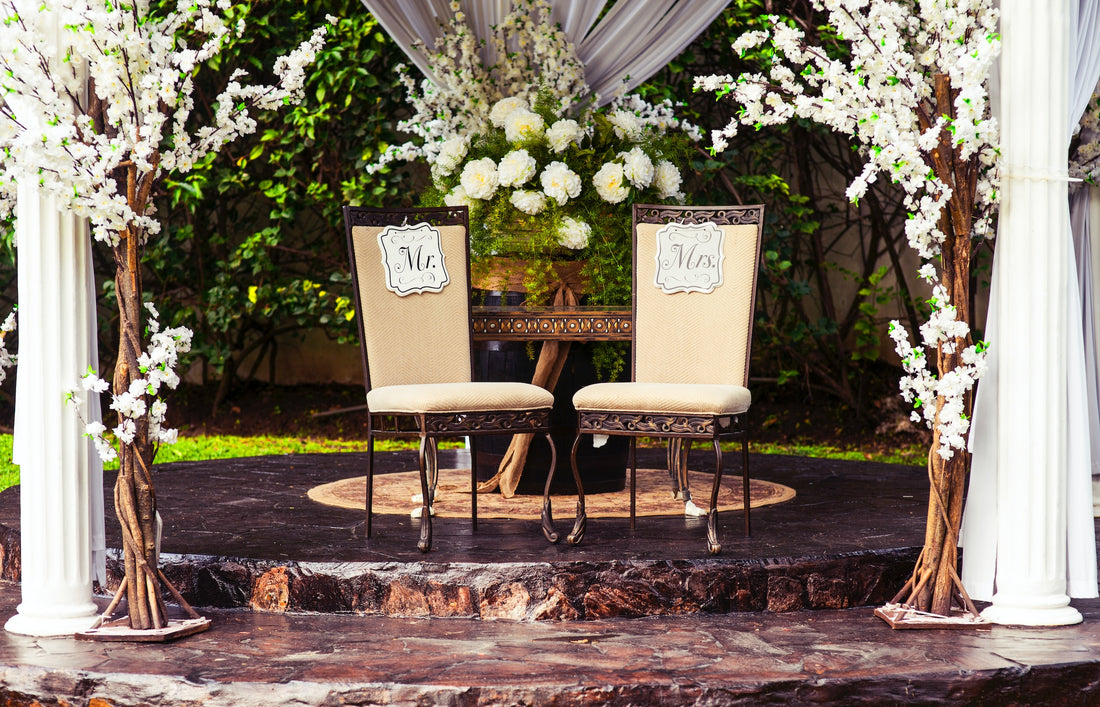Introduction
Planning a wedding is an exciting journey filled with joy, anticipation, and meticulous attention to detail. As you embark on this once-in-a-lifetime experience, it's essential to have a solid roadmap to guide you through the process. In this ultimate guide to wedding event planning, we'll share invaluable tips, expert advice, and creative ideas to help you create an unforgettable celebration of love.

Photo By Thomas William (@thomasw)
I. Setting the Foundation: Establishing Your Vision
Every wedding begins with a vision. Start by envisioning your dream wedding and setting clear goals to create a celebration that perfectly reflects your personalities and love for each other. Consider the theme, atmosphere, and overall style you wish to convey, whether you envision an intimate garden ceremony or a grand ballroom reception, let your imagination lead the way and your personalities shine through as you determine the key elements that will make your wedding day unforgettable and remember, this is your day, your vision, your love story - so make it uniquely yours!

Photo By Álvaro CvG (@alvarocvg)
II. Budgeting and Financial Planning
Creating a budget is a crucial step in wedding planning. Assess your financial resources, prioritize your expenses, and allocate funds accordingly. From venue and catering to attire and decorations, understanding your budgetary limitations will help you make informed decisions and prevent overspending.
• Define Your Priorities: Before diving into the financial aspects, take the time to sit down with your partner and identify your priorities for the wedding. Determine the key elements that matter most to you, such as the venue, catering, photography, or entertainment. This will help you allocate your budget accordingly and ensure you're investing in what truly matters to you both.
• Assess Your Finances: Take a realistic look at your current financial situation. Calculate your combined income, savings, and any contributions from family members. Determine how much you can comfortably set aside for the wedding without jeopardizing your overall financial stability. Remember, it's important to start your married life on a solid financial foundation.
• Create a Detailed Budget: Once you have a clear understanding of your finances, it's time to create a detailed budget. Start by making a comprehensive list of all wedding-related expenses, including the venue, catering, attire, decorations, invitations, transportation, and more. Research costs in your area and allocate appropriate amounts to each category. Be sure to leave some room for unexpected expenses that may arise.
• Prioritize Cost-Saving Measures: Weddings can be costly, but there are several ways to cut expenses without sacrificing the overall experience. Consider alternatives like booking your wedding during the off-peak season, opting for a smaller guest list, or choosing a non-traditional venue. DIY projects, such as creating your own wedding invitations or decorations, can also help save money.
• Negotiate and Research Vendors: When selecting vendors, be diligent in researching different options and obtaining multiple quotes. Don't be afraid to negotiate and ask for discounts or package deals. Read reviews and check references to ensure that you're hiring reliable professionals who align with your vision and budget.
• Track Your Expenses: Throughout the planning process, keep a record of all your wedding expenses. Utilize budgeting tools or spreadsheets to monitor your spending and compare it to your initial budget. This will help you identify areas where you may need to cut back or adjust your plans to stay within your means.
• Consider Financing Options: If you anticipate exceeding your budget or require additional funds, explore financing options carefully. Personal loans or credit cards may be viable solutions but remember to weigh the pros and cons and assess the interest rates and repayment terms. Ensure you have a plan to pay off any borrowed amount responsibly.
• Regularly Review and Adjust: Wedding planning is a dynamic process, and it's important to regularly review and adjust your budget as necessary. Keep open lines of communication with your partner and make informed decisions together. Be prepared to make compromises or reallocate funds to different aspects of the wedding based on your evolving priorities.

III. Securing the Perfect Venue
Selecting the ideal venue sets the stage for your wedding. Whether it's a picturesque garden, a grand ballroom, or a rustic barn, consider factors such as capacity, ambiance, and accessibility. Schedule site visits, negotiate contracts, and ensure that the venue aligns with your vision and logistical requirements.
To help you secure the ideal venue that aligns with your vision, budget, and guest list, we've compiled some essential tips and considerations:
1- Determine Your Wedding Style:
Before you begin your search for a wedding venue, it's essential to have a clear vision of your wedding style. Determine whether you prefer a traditional indoor wedding, a romantic outdoor ceremony, a rustic barn wedding, or a contemporary venue. Knowing your preferred style will narrow down your options and make the selection process easier.

2- Establish a Budget:
Wedding venues can vary significantly in price, so it's crucial to establish a realistic budget before you start looking. Allocating a specific portion of your overall budget to the venue will help you filter out options that are beyond your financial means. Remember to account for additional expenses such as catering, decorations, and any venue-specific requirements.

Photo By Thought Catalog (@thoughtcatalog)
3- Consider Guest Count and Location:
Have an estimate of your guest count before you start visiting venues. Some venues have limitations on capacity, and you'll want to ensure that your chosen venue can comfortably accommodate your guests. Additionally, consider the location of the venue in relation to your ceremony site, transportation, and accommodation options for out-of-town guests.

Photo By Yomex Owo (@yomex4life)
4- Research and Visit Multiple Venues:
Take the time to research and visit multiple venues to explore your options thoroughly. Utilize online resources, read reviews, and check out venue websites and social media profiles. Shortlist venues that align with your style, budget, and guest count, and schedule site visits to get a better feel for each location.

Photo By Arshad Pooloo (@arshadpooloo)
5- Consider Venue Amenities and Services:
Each venue offers its unique amenities and services. Consider what's included in the venue package, such as tables, chairs, linens, sound systems, lighting, and on-site coordination. Some venues may also provide catering services or have partnerships with specific vendors. Assess these offerings and determine if they align with your needs and preferences.

Photo By Shardayyy Photography (@shardayyy)
6-Take Note of Venue Restrictions and Requirements:
Before signing any contracts, thoroughly review the venue's policies, restrictions, and requirements. Some venues may have specific regulations regarding noise levels, decor restrictions, or preferred vendors. Ensure you understand these guidelines and assess whether they align with your vision for the wedding.

Photo By David Travis (@dtravisphd)
7- Flexibility in Date and Time:
If you have flexibility in your wedding date and time, it can work to your advantage when securing a venue. Popular venues often have high demand during peak wedding seasons and weekends, which can lead to higher prices and limited availability. Consider booking your wedding during off-peak seasons or weekdays to potentially secure a better deal or have more options to choose from.

Photo By Abby Savage (@abbysavagecreative)
8- Read and Negotiate Contracts:
Once you've found the perfect venue, carefully read through the contract before signing. Pay close attention to the pricing structure, payment terms, cancellation policies, and any additional fees or requirements. If there are any clauses that you're unsure about or wish to negotiate, don't hesitate to discuss them with the venue coordinator.

Photo By Romain Dancre (@romaindancre)
IV. Crafting a Memorable Guest Experience
Delight your guests with a thoughtfully planned experience. From save-the-dates and invitations to seating arrangements and entertainment, focus on creating a welcoming and enjoyable atmosphere. Consider unique touches like personalized favors, interactive elements, and surprise elements that will leave a lasting impression.

Photo By Photos by Lanty (@photos_by_lanty)
V. Wedding Attire and Beauty
The bride's and groom's attire play a significant role in the overall aesthetic of the wedding. Explore different styles, consider dress codes, and schedule fittings well in advance. Don't forget to plan hair, makeup, and grooming services to ensure everyone looks their best on the big day.

VI. Culinary Delights: Menu Planning
Crafting a memorable culinary experience is essential. Collaborate with reputable caterers to curate a menu that suits your taste and dietary preferences. Consider food stations, signature cocktails, and creative desserts to elevate the dining experience and create a feast for the senses.

Photo By zeno Aras (@araspower)

Photo By Hernán Toro - Photography
VII. Capturing Priceless Moments: Photography and Videography
Hiring skilled photographers and videographers is crucial to preserving the precious memories of your special day. Research professionals, review portfolios, and communicate your expectations. Discuss shot lists, highlight reels, and post-production options to ensure you receive stunning visual mementos of your wedding.

VIII. Floral Designs and Décor
Transform your venue into a breathtaking wonderland with carefully curated floral designs and décor. Collaborate with talented florists and event designers to bring your vision to life. From centerpieces and bouquets to lighting and drapery, every detail should harmonize with your chosen theme and color scheme.

Photo By Samantha Gades (@srosinger3997)

Photo By Thomas William (@thomasw)
IX. Navigating Wedding Logistics
Wedding logistics involve managing timelines, coordinating vendors, and overseeing the flow of events. Create a comprehensive timeline, communicate with vendors, and designate a point person or wedding planner to ensure everything runs smoothly on the day of the wedding.

Photo By Annie Gray (@anniegray)
X. Embracing the Finishing Touches
Incorporate personal touches and unique elements that reflect your love story. From heartfelt vows and memorable speeches to surprise entertainment and interactive guest activities, infuse your wedding with elements that make it a true reflection of your journey together.

Photo By Camden & Hailey George (@crtvduo)
Conclusion
Wedding event planning is an intricate process that requires careful attention to detail, creativity, and organization. By following this ultimate guide, you'll be equipped with the knowledge and inspiration to create a wedding that exceeds your expectations and leaves lasting memories for you and your loved ones. Embrace the journey, enjoy every moment, and treasure the celebration of your love.
Blog Cover Photo By Guanfranco G (@guanfranco)





